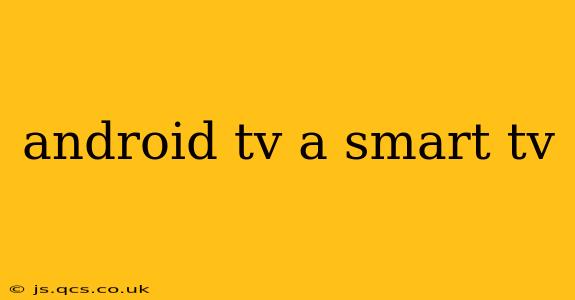Android TV is often discussed in the context of smart TVs, but what exactly is the relationship? Is an Android TV always a smart TV? Let's clear up the confusion and delve into the specifics. The short answer is: Yes, an Android TV is a type of smart TV, but not all smart TVs are Android TVs.
Think of it this way: smart TVs are a broad category of televisions with internet connectivity, offering access to streaming services, apps, and other smart features. Android TV is a specific operating system used by some manufacturers to power these smart TV features. Just like some phones use Android and others use iOS, some smart TVs use Android TV and others use different operating systems like Roku, webOS, Tizen, or others.
What Makes Android TV a Smart TV?
Android TV's smart features are what make it a smart TV. These include:
- Streaming Apps: Access to a wide range of streaming apps like Netflix, Hulu, Disney+, YouTube, and many more, allowing you to stream your favorite movies, shows, and videos.
- Google Play Store: Similar to your smartphone, you can download and install various apps from the Google Play Store, expanding the functionality of your TV beyond just streaming.
- Voice Search: Use your voice to easily search for content, apps, or settings, making navigation more intuitive.
- Google Assistant Integration: Control your TV and other smart home devices with your voice through the built-in Google Assistant.
- Casting: Cast content from your smartphone, tablet, or laptop to your Android TV for a larger screen experience.
What are the Differences Between Android TV and Other Smart TVs?
While Android TV shares many similarities with other smart TV platforms, some key differences exist:
- Operating System: Android TV uses Google's Android operating system, while others use proprietary systems like Roku, webOS, or Tizen. This impacts the user interface, app selection, and overall functionality.
- App Selection: Although the app selection is extensive on Android TV, the availability of specific apps may vary compared to other platforms.
- User Interface: Each platform offers a unique user interface, impacting navigation and ease of use. Some users may find one platform more intuitive than another.
- Integration with Other Devices: Android TV's integration with other Google devices and services is often stronger than platforms from other manufacturers.
What are the Advantages of Android TV?
Android TV offers several compelling advantages:
- Vast App Selection: Access to a wide variety of apps, exceeding many competing platforms.
- Google Assistant Integration: Seamless voice control and smart home integration.
- Familiar Interface: For Android smartphone users, the interface will be intuitive and easy to navigate.
- Regular Updates: Generally receives regular software updates, ensuring ongoing performance and security improvements.
Is Android TV Worth It?
Whether or not Android TV is worth it depends on individual preferences and needs. If you value a large app selection, seamless Google integration, and a user-friendly interface, it's an excellent option. However, other smart TV platforms also offer great features and may better suit specific needs.
What are the Differences Between Android TV and Google TV?
This is a common point of confusion. Google TV is essentially an enhanced version of Android TV. It features a more refined user interface, improved recommendations, and a more personalized viewing experience. Many newer Android TVs now utilize the Google TV interface instead of the more traditional Android TV interface. Think of it as an upgrade.
How Can I Tell If My TV is an Android TV?
Check your TV's settings menu for the "About" or "System" section. This usually specifies the operating system your TV uses. Look for "Android TV" or "Google TV."
Can I Upgrade My Smart TV to Android TV?
You cannot directly upgrade a non-Android TV to Android TV. You'd need to purchase a new Android TV to access the Android TV platform.
By understanding the nuances of Android TV and comparing it to other smart TV platforms, consumers can make informed decisions when purchasing a new television. The choice ultimately depends on personal preferences and the features deemed most important.
